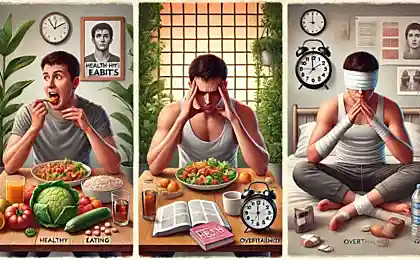301
11 Ways You Are Complicating Your Life

Every day, we make dozens of decisions, form habits and build relationships without noticing how many of our actions and thoughts gradually turn life into a complex maze. Psychological studies show that up to 80% of daily difficulties we create ourselves. The good news is that becoming aware of these mental pitfalls is the first step towards a more harmonious and happier life.
Mental barriers and self-sabotage
Our brains are amazing tools, but they can work against us and against us. Often, we create obstacles that we struggle to overcome, spending precious resources such as time, energy and emotional well-being.
According to neuroscientists, our brains constantly strive to save energy by using well-trodden neural pathways, even if they lead to inefficient decisions. This explains why we are so often stuck in patterns of behavior that complicate our lives.
1 Perfectionism – the pursuit of the unattainable
Striving for perfection seems like a virtue, but in practice it often becomes a brake. Perfectionists spend a disproportionate amount of time on details that no one else will notice, experience chronic stress, and often put off starting important projects for fear of not achieving the ideal.
Practical advice:
Implement the “good enough” rule. Define minimum quality criteria for each task and do not exceed them for no good reason. Remember: 80% of the result is achieved in 20% of effort, and the remaining 20% of perfection takes 80% of energy.
2 Procrastination and postponing for later
Procrastination is not just laziness, but a complex psychological mechanism for avoiding discomfort. By postponing important tasks, we temporarily reduce anxiety, but create problems in the future when we have to act in conditions of lack of time and increased stress.
Practical advice:
Use the "Swiss cheese" technique - start with a small, simple aspect of the task that can be completed in 5 minutes. This will reduce the psychological barrier and trigger the engagement mechanism. Research shows that starting an action requires more energy than continuing it.
3 Information overload and digital dependency

Modern man processes 5 times more information than 30 years ago. The constant flow of news, notifications and messages overloads the brain, reduces the ability to concentrate and make decisions. We spend up to 3 hours a day scrolling and checking messages while experiencing FOMO.
Practical advice:
Set “Information Boundaries” – set hours for checking email and social media. Turn off all unimportant notifications. Practice digital detox on the weekend. For important contacts, set up special beeps to avoid missing really important messages.
4 Avoiding unpleasant emotions
Paradoxically, avoiding negative emotions makes us more vulnerable to psychological problems. Studies show that people who suppress their emotions are more likely to suffer from depression, anxiety and psychosomatic diseases. Emotional avoidance forms a vicious circle: the more we avoid discomfort, the less resilient we become.
Pain is part of growth. When you avoid difficulties, you also avoid development. Failure is the laboratory of success.
5 Excessive introspection and rumination
Repeated thinking about the same thoughts, especially negative ones, creates neural connections that reinforce negative perceptions. The more we focus on the problem, the bigger it seems. Rumination rarely leads to constructive solutions, instead increasing anxiety and reducing motivation.
Practical advice:
Practice “limited anxiety” – set aside 15-20 minutes a day to think about problems. When obsessive thoughts come at other times, remind yourself that they have their own “reception time,” and shift your attention to the current task.
Social factors of self-complication
6 Comparing yourself to others
Social media has created a culture of constant comparison where we only see edited versions of other people's lives. Neurophysiological studies show that the comparison activates the same areas of the brain as physical pain, and frequent comparison correlates with elevated levels of cortisol, a stress hormone.
Practical advice:
Refocus the comparison on yourself in the past, not others. Keep a diary of achievements, even the smallest, and periodically re-read it to see your progress. This activates the dopamine reward system and increases motivation.
7 Failure to set healthy boundaries
Many of us are afraid to say no for fear of disappointing others. As a result, we are making excessive commitments, dissipating energy and resources. Studies show that people who do not know how to set boundaries are more likely to experience burnout and have lower levels of life satisfaction.
It is important to understand that when you set healthy boundaries, you do not reject people, but care about the quality of relationships. Paradoxically, clear boundaries make relationships deeper and more authentic.
8 Toxic environment
 19
19Psychologists say that we become the average of the five people with whom we spend the most time. An environment that constantly criticizes, devalues accomplishments, or imposes guilt is imperceptibly undermining your self-esteem and energy. Toxic relationships activate the sympathetic nervous system, maintaining chronic stress.
Practical advice:
Do an audit of your surroundings. Ask yourself, “Am I feeling exhausted or inspired?” Gradually increase your distance from energy vampires and actively seek out people who support your growth.
Cognitive distortions and mental habits
9 Catastrophization – Expecting the Worst
Our brains are evolutionarily tuned to identify threats, which in the modern world often leads to exaggeration of possible negative consequences. Constant waiting for a disaster activates the sympathetic nervous system, increases the level of cortisol and adrenaline, which depletes the body and reduces immunity.
Practical advice:
Practice the “decatastrophizing” technique: When negative scenarios fill your mind, ask yourself three questions: “How likely is this scenario?”, “What can I do if this happens?”, “How have I overcome such situations before?” This activates the prefrontal cortex, the brain region responsible for rational thinking.
10 Black and White Thinking
Dichotomous thinking — the tendency to see the world in extremes — greatly narrows the range of possible solutions and creates constant tension. “All or nothing”, “perfect or failure” – such attitudes make the criteria of success unattainable and block the flexibility of thinking.
Reality exists in shades of gray. The more gradations you can distinguish, the richer and more nuanced your life becomes.
11 Resistance to change
The desire for stability is inherent in us evolutionary - the unknown is perceived by the brain as a potential threat. However, in today’s fast-changing world, clinging to the familiar often leads to stagnation and missed opportunities. Psychological research shows that people systematically overestimate the risks of change and underestimate the cost of inaction.
Practical advice:
Instead of rejecting change outright, use the “intelligence by battle” technique – experiment with small changes that can be easily reversed. This helps the brain gradually adapt to uncertainty and reduces stress hormone levels when confronted with novelty.
The Way to Simplification: Mindfulness and Gradual Change
Simplifying life is not a one-time action, but a constant practice of awareness. By paying attention to how we create our own complexities, we can change those patterns. Start small – pick one of the self-complicating ways that resonates with you the most and work on it for the 21 days it takes to form a new habit.
Remember: Simplicity is not primitiveness, but clarity, focus, and conscious choice of what matters. As Leonardo da Vinci said, “Simplicity is the highest form of sophistication.”
Glossary
Procrastination is the voluntary postponement of planned activities despite the expected negative consequences. Unlike simple laziness, procrastination is often accompanied by awareness of the problem and psychological discomfort.
Rumination is the compulsive repetition of the same thoughts, especially those related to negative past events or worries about the future. Different from constructive analysis is the lack of progress and solutions.
Lost Profit Syndrome (FOMO) is the fear of missing out on an interesting event or opportunity, especially when browsing social networks where people share predominantly positive moments in their lives.
Catastrophization is a cognitive distortion in which a person is inclined to imagine the worst-case scenarios of a situation and overestimate their likelihood and consequences.
Dichotomous (black and white) thinking is the tendency to perceive situations, people or events in extreme categories, ignoring intermediate options and nuances. It is manifested in the phrases “all or nothing”, “friend or enemy”, “success or failure”.
Cognitive distortions are systematic errors in thinking that arise from dysfunctional beliefs embedded in cognitive circuits and affect a person’s decision-making and judgment.
What's wrong with chimeras: opinions of other generations | We understand how Generation Z differs from others and what skills it lacks
Grandaxin: use, indications and effectiveness of tranquilizer in anxiety disorders























